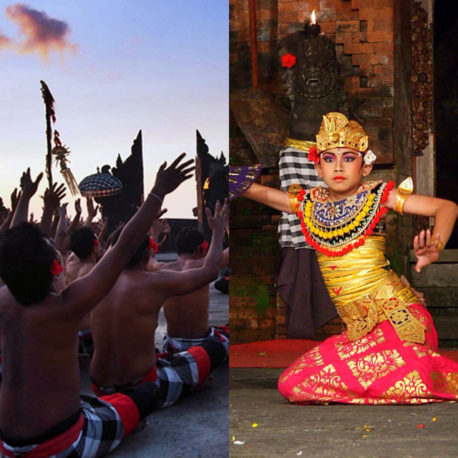Ensemble Tri Pusaka Sakti Bali Theater and Dance

Ensemble Tri Pusaka Sakti Bali Theater and Dance
We feel an urgent for theater which events do not surpass, which exerts deep resonance in us and dominates the instability of time, This is a theater constituted of poetry in space, punctuated by the gesture making body, by a new physical language, built on signs, no more on words. Oriental theater, with its metaphysical tendencies is, thus, opposed to occidental theater with its psychological tendencies.
Antonin Artaud Le Théatre et son double
Kecak, Barong, Legong, Topeng, Pendet, etc., more than fifty dance theaters are to be found in Bali. Each of them evokes princesses, gods, demons and mythical warriors, generally drawn from the Ramayana Hindu era. The very rich costumes and the constraining bodily gestures, extremely stylized, exert both intrigue and fascination. Repesentations are always accomanied by the Balinese orchestra, the Gamelan.
The ensemble is directed by I Made Djimat, one of the most renowned, if not the geatest, dancers in Bali Island. He was born in Batwan village (Sukawati Gianyar-Bali –Indonesia) in 1948, and is the son of I Nyoman Reneh, an artist sculptor and painter, and of Ni Ketut Cenik, a legendary dancer. When he was five, the child prodigy danced in his village temple. He was passionate about dancing and left the public school rather early to pursue his studies with great masters like Anak Agung Raka, I Nyoma Kakul in Batuan, or else with I Made Marya, the great creator of Kabyar dance.
At the age of 16, he undertook his first tour abroad, and at 18 he won the first award of the Balinese festival as best interpreter of Baris (warrior dance), and two years later as Jauk (demon). His fame was, thus, established on the island and he bacame the most talented interpreter of Topeng (masked ritual game). Soon, he set up his own musical ensemble (Panti Pusaka Budaya, later renamed Tri Pusaka Sakri) with which he reached excellence in various forms of Balinese theater.
